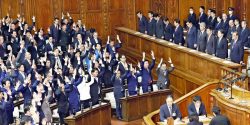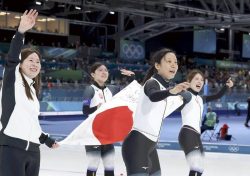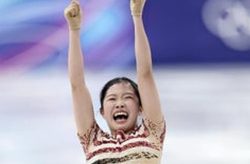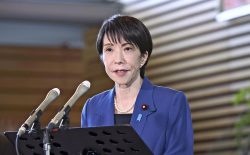16:06 JST, June 25, 2022
Russia, which has invaded Ukraine, has threatened to use nuclear weapons in an attempt to expand its territory by force. Measures must be considered to bridge the gap between this harsh reality and the ideal of nuclear abolition.
States parties to the Treaty on the Prohibition of Nuclear Weapons (TPNW), an agreement that comprehensively bans nuclear activities such as the development, possession, use and threat of nuclear weapons, held their first meeting in Vienna. More than 60 countries have ratified the treaty, which came into force last year.
Nuclear powers — the United States, Britain, France, China and Russia — do not participate in the TPNW, so they are not bound by its rules. As the treaty also rejects the use of nuclear weapons for deterrence, Japan and certain European countries, which are allies of the United States and seek to ensure security under the U.S. nuclear umbrella, have not joined the treaty as well.
It is necessary to look at the situation in which nuclear weapons function to prevent wars between major powers in the real world. The United States and Russia have avoided direct military conflict over the Ukrainian crisis apparently because both countries are aware that direct military confrontation between them could lead to a catastrophic nuclear war.
Sweden and Finland have begun the process of changing their stance of military neutrality and joining the North Atlantic Treaty Organization (NATO). This is based on the judgment that the NATO nuclear umbrella is effective in protecting their countries from Russian threats.
At the first TPNW meeting, a statement calling for non-signatories to join the treaty was adopted, but as long as the current reality is ignored, this call might end up being simply an empty slogan.
Germany, a NATO member, attended the meeting as an observer, while Japan skipped it.
Germany has a nuclear sharing system under which U.S. nuclear weapons in Germany can be used in emergencies. Because this system is directly connected to nuclear deterrence, there is no room to misunderstand Germany as being supportive of the treaty.
Japan does not possess nuclear weapons and relies on U.S. nuclear forces. If Japan gives the impression that it is positive about the treaty, that could undermine the credibility of the nuclear deterrence system between Japan and the United States. It is reasonable for Japan to forgo its attendance at the meeting.
China and Russia have increased their production of nuclear weapons and advanced the improvement of such weapons. To counter this move, the United States, Britain and France have strengthened their nuclear deterrence capabilities. A report released this month by a Swedish research institute projected that the number of nuclear warheads in the world would start to increase over the next 10 years.
The Treaty on the Non-Proliferation of Nuclear Weapons (NPT), to which 191 countries and regions across the globe are parties, is the only framework under which nuclear powers and non-nuclear countries can work together to stave off nuclear arms expansion. While the NPT allows the United States, Britain, France, China and Russia to possess nuclear weapons, it also obliges them to engage in talks for nuclear arms reduction.
Prime Minister Fumio Kishida plans to attend an NPT review conference in August as the first Japanese prime minister to do so. It is hoped that he will convey a message that will connect countries from a standpoint of being deeply aware of both the inhumanity of nuclear weapons and their role in security.
(From The Yomiuri Shimbun, June 25, 2022)
Top Articles in Editorial & Columns
-

40 Million Foreign Visitors to Japan: Urgent Measures Should Be Implemented to Tackle Overtourism
-

University of Tokyo Professor Arrested: Serious Lack of Ethical Sense, Failure of Institutional Governance
-

China Provoked Takaichi into Risky Move of Dissolving House of Representatives, But It’s a Gamble She Just Might Win
-

Policy Measures on Foreign Nationals: How Should Stricter Regulations and Coexistence Be Balanced?
-

PM Takaichi Should Help Young Japanese Break Seniority Barrier to Vitalize Politics
JN ACCESS RANKING
-

Japan Institute to Use Domestic Commercial Optical Lattice Clock to Set Japan Standard Time
-

Israeli Ambassador to Japan Speaks about Japan’s Role in the Reconstruction of Gaza
-

Man Infected with Measles May Have Come in Contact with Many People in Tokyo, Went to Store, Restaurant Around When Symptoms Emerged
-

Prudential Life Insurance Plans to Fully Compensate for Damages Caused by Fraudulent Actions Without Waiting for Third-Party Committee Review
-

Woman with Measles Visited Hospital in Tokyo Multiple Times Before Being Diagnosed with Disease






















